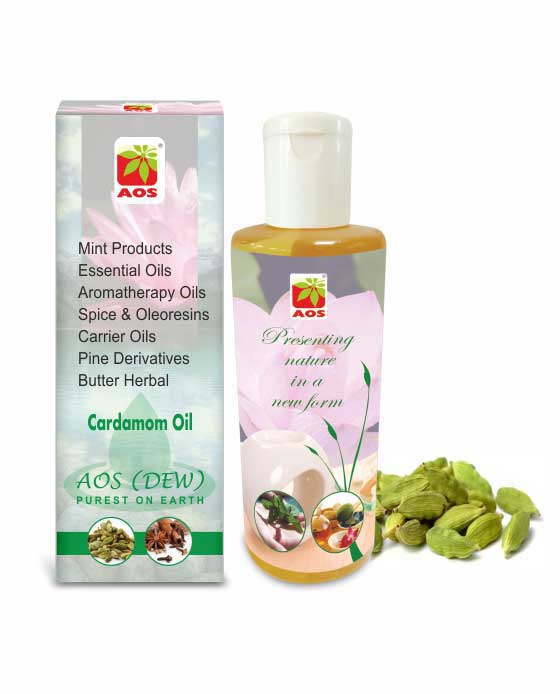

ooking for reliable Cardamom Oil Manufacturers? We specialize in producing and exporting premium-grade cardamom oil, extracted using steam distillation from high-quality Elettaria cardamomum seeds. Our oil is rich in natural aroma, flavor, and therapeutic properties—ideal for use in aromatherapy, cosmetics, pharmaceuticals, and food flavoring.
Cardamom oil , derived from the seeds of the Elettaria cardamomum plant, is one of the most treasured essential oils in the world. With its warm, spicy, and slightly sweet aroma, cardamom oil has been used for centuries in traditional medicine, cooking, and aromatherapy. This essential oil is renowned for its numerous health benefits, from aiding digestion to promoting mental clarity. In this article, we'll explore the benefits, uses, and considerations for using cardamom oil, as well as the importance of selecting high-quality oils
Cardamom oil is extracted through steam distillation of cardamom seeds. It is known for its warm, spicy-sweet aroma and golden color. This oil is packed with active compounds like cineole, alpha-terpineol, and linalool, which contribute to its many therapeutic effects.When choosing a cardamom oil, make sure to select one that is 100% pure, organically sourced, and produced with the highest standards to ensure maximum benefits. With its rich history and numerous health properties, cardamom oil remains a cherished oil in both traditional and modern wellness practices
Extraction Process: The oil is extracted from seeds pods of cardamom through using steam distillation method. The main constituents of cardamom oil are sabinene, nerol, limonene, eugenol, terpinene, cineol, geraniol, linalool, nerodilol, heptenone, borneol, alpha-terpineol, beta Terpineol, terpinyl Acetate, alpha-Pinene, myrcene, neryl acetate, cymene, methyl heptenone, linalyl acetate, and heptacosane.
Our Cardamom Oil is meticulously extracted to meet BP (British Pharmacopoeia) and USP (United States Pharmacopeia) standards, ensuring pharmaceutical-grade purity and potency. Sourced from the finest cardamom seeds, this essential oil is rich in natural compounds,Cardamom essential oil, extracted from seeds, is used for aromatherapy, skin/hair care, and as a disinfectant
Cardamom oil is a versatile and highly beneficial essential oil, offering a wide range of uses from digestive support to skincare and mental clarity. Whether used for aromatherapy, massage, or as part of a skincare regimen, cardamom oil can enhance your well-being
Properties, Uses and Benefits: Cardamom seeds are rich in minerals such as calcium, sulfur and phosphorus. The oil contains sweet and spicy fragrance with pale yellow in coloration and have barely watery viscosity. also contains antiseptic, aphrodisiac, antimicrobial, astringent, digestive, stimulant, stomachic, and diuretic properties.
Cardamom Oil is a highly valued essential oil derived from the seeds of Elettaria cardamomum, commonly known as cardamom. Known for its rich aroma and numerous health benefits, it is widely used in the pharmaceutical, cosmetic, food, and aromatherapy industries. Cardamom oil for skin Manufacturer and Supplier, we ensure the highest quality, purity, and efficacy in every drop of our product. Cardamom oil is obtained by steam distillation of Elletaria cardamomum (L) Maton,
(FAQ)
A: Cardamom oil is an essential oil extracted from the seeds of the Elettaria cardamomum plant, a spice belonging to the ginger family. It has a sweet, spicy aroma and is widely used in aromatherapy, perfumery, food flavoring, and traditional medicine.
Aromatherapy to relieve stress and anxiety
Pure cardamom oil is produced through steam distillation of cardamom seeds. Trusted Cardamom Oil Manufacturers ensure high purity, natural composition, and food/pharma-grade quality.
Cardamom oil is available from reputed Cardamom Oil Manufacturers and Suppliers who offer bulk quantities for pharmaceutical, food, cosmetic, and aromatherapy industries.
A good manufacturer provides 100% pure oil, follows GMP & ISO standards, and supplies cardamom oil in IP, BP, and USP grades.
